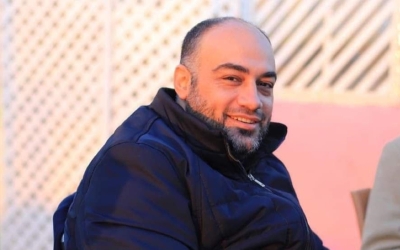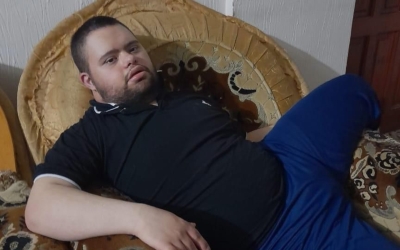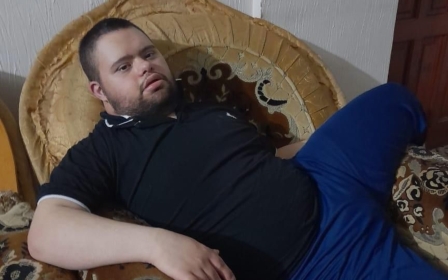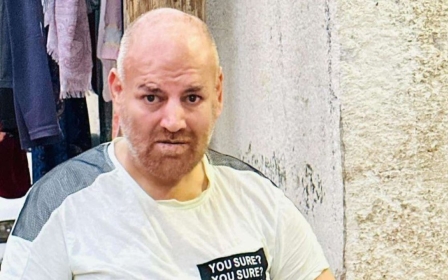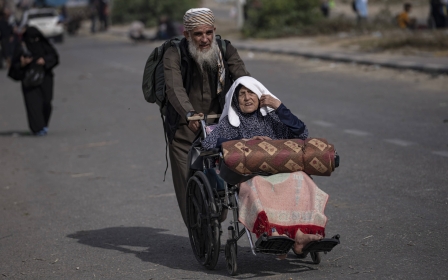Gaza family accuses Israel of killing Palestinian with Down syndrome during incursion
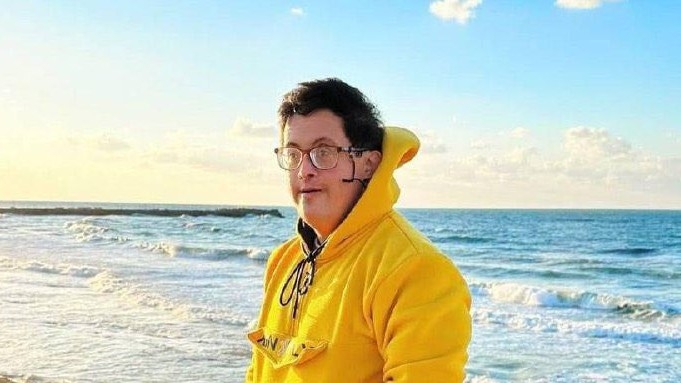
One day after they buried their brother, the al-Abadla siblings found his leg about 200 meters away from where he was killed by what they believe was an Israeli drone strike in Gaza.
Ahmed Saeed Masoud al-Abadla, 29, who had Down syndrome, had been displaced for around nine months, living in a tent in Mawasi al-Qarara in Gaza’s Khan Younis along with his mother and married brother, Feras.
Before going missing for three days, Ahmed wanted to return to his home in Qarara to inspect the damage during an Israeli incursion into the southern Gaza Strip.
“Ahmed had exceptional cognitive abilities for someone with his condition. When he joined the Right to Life School as a child, he received a certificate proving that he was one of the smartest children with Down syndrome,” his brother, Feras, told Middle East Eye.
Before his death, Ahmed was staying with his family in the tent where they took shelter after being displaced during the war.
New MEE newsletter: Jerusalem Dispatch
Sign up to get the latest insights and analysis on Israel-Palestine, alongside Turkey Unpacked and other MEE newsletters
"We lived on Street 2 in al-Qarara but were displaced from our home since the beginning of the war," he said.
The al-Abdala family were forced to leave their home during hostilities on 10 October, then returned during the truce in November, before being displaced twice more until they ended up in the Mawasi area of Qarara.
'He communicated well with others, and his speech was clear. He had many friends and was dearly loved by his family and the neighborhood'
- Feras, Ahmed's brother
On 2 July, the Israeli army began its invasion of Khan Younis, intensifying its attacks following mass evacuation orders. The initial phase of the invasion lasted approximately a week, concluding on 10 July.
However, sporadic military actions and operations in Khan Younis continued throughout July, resulting in the displacement of around 40,000 Palestinians.
On 25 July, Ahmed told his family he was heading out and left their makeshift tent.
“He often went out by himself; he knew where to go," Feras explained, adding that his brother would usually be gone for a few hours to visit friends or cousins in the area before coming back.
"He communicated well with others, and his speech was clear. He had many friends and was dearly loved by his family and the neighborhood,” Feras added.
“Because of his strong communication skills, we were not one of those families that kept their son with Down syndrome confined, though we did not let him wander alone all the time either," he told MEE.
"One of Ahmed’s clever traits was that if he ever stayed out late, he would go to one of his cousins and say, ‘Come with me to the house; they will definitely scold me for being late.’ He was aware of what was right and wrong.”
‘Clearly Intentional’
After every military incursion into their neighbourhood in Qarara, Feras would take his brother in the car to check on their home and inspect the damage in the area.
On the day Ahmed went missing, his family believes he likely intended to do the same.
“Ahmed went out with a relative of ours who had limited cognitive abilities. It seems they intended to check on the house and the area, so they went without us knowing,” Feras told MEE.
“By 9 or 10 pm, I felt something was wrong. Then, the son of the man who went out with Ahmed came to me and said that his father was also late returning home. That’s when I knew something was seriously wrong.”
On the same night, Feras reported Ahmed missing to the police. The next morning, he contacted the Red Cross and searched for him in emergency rooms, intensive care units, and morgues at both Nasser Hospital in Khan Younis and al-Aqsa Martyrs Hospital in Deir al-Balah.
Three days later, on 28 July, the family received news from a neighbour in Qarara that Ahmed was killed, and his body remained on the ground near their home.
"My brother went that night to look for Ahmed, despite the situation still being extremely dangerous. He found his body, which had already begun to decompose, near our home. He asked a resident with an animal-drawn cart for help, and they transported his body on the cart to al-Aqsa Martyrs Hospital. We buried him that same night," Feras recounted.
'His body was clearly decomposed ... His legs were amputated at the knees'
- Feras, Ahmed's brother
"His body was clearly decomposed, and it was evident that he had been martyred on the day he went missing. His legs were amputated at the knees - one leg was completely missing. We found it the next day, about 200 meters from where his body had been."
Ahmed’s family believes he was killed by an Israeli drone strike that specifically targeted him and his relative.
“My brother told me that when he moved the body, he found a hole beneath it with a diameter of about 6 or 7 cm. The same hole was visible in his chest, which indicates that the strike came from above, rather than from an artillery shell,” he said.
“This is even more alarming because if it was indeed a drone that hit him, it means the officer who controlled the drone could clearly see and record him, identifying him as an unarmed civilian, yet they still hit him. It was clearly intentional.”
‘He wanted to live’
Due to the severe decomposition of his body, Ahmed's brother buried him immediately, without allowing their mother to see him.
“The three days he was missing were the hardest for our mother. When she learned he was martyred, she was devastated and wanted to see him, but I didn’t let her,” Feras said. “I didn’t want her to see him in this condition. I wanted her to remember his beautiful face.”
Ahmed's family is particularly devastated by his death because he was “aware of life and death and always tried to stay safe from the shelling”.
“Ahmed kept asking us to let him get married. He knew there was a war on Gaza, but he wanted to live,” Feras added.
Feras said that when he contacted the Red Cross to report Ahmed’s death, a representative told him this was not an isolated case.
The aid group had documented several instances of people with Down syndrome being killed through various means by the Israeli military in Gaza.
Last month, Middle East Eye reported on the death of Muhammed Bhar, a 24-year-old Palestinian with Down syndrome, following a raid by Israeli soldiers on his family home in the Shujaiya neighbourhood of eastern Gaza City on 3 July.
Two weeks after this report, the Israeli army admitted that Bhar, who died after being attacked and wounded by an army dog, was abandoned by the soldiers.
Middle East Eye delivers independent and unrivalled coverage and analysis of the Middle East, North Africa and beyond. To learn more about republishing this content and the associated fees, please fill out this form. More about MEE can be found here.


